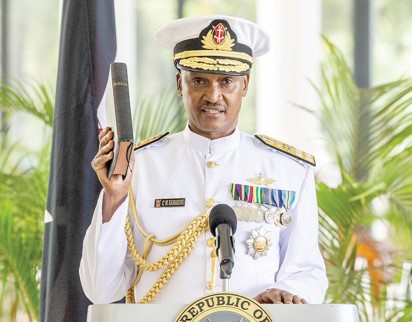Let General Kahariri be heard like the rest of us

Last week, the political class went hammer and tongs at Chief of Defence Forces General Charles Kahariri, after he expressed a personal opinion during a public lecture on intelligence and national security.
General Kahariri wondered why the very Kenyans who voted for the Kenya Kwanza alliance regime were now shouting “[Ruto] must go” when they actually have an opportunity to review their choice of leadership in 2027.
His views drew a barrage of condemnations, with the most notable coming from former Deputy President Geoffrey Rigathi Gachagua and former Defence Cabinet Secretary Eugene Ludorvick Wamalwa.
Gachagua, Eugene and a host of other political actors urged Kahariri and the military in general to remain in the barracks and completely keep off politics.
General Kahariri has not uttered a word since, and it is very unlikely that he will speak again regarding the same matter.
However, the chorus of attacks levelled against Kahariri raises the question of whether someone holding that office has a right to express their personal views.
Kahariri might have attracted flak by his claim that the “must go” sloganeering is “unconstitutional”.
However, does the law bar him from publicly stating his mind?
This is a matter that we need to seriously and consistently ventilate on for the sake of entrenching our democracy.
Personal opinions
Ordinarily, a public lecture is all about one’s personal opinions. Kahariri was just one of the persons, alongside the National Intelligence Service Director-General, who spoke at the function.
Though not schooled in law, I have not come across any legislation that prohibits the head of Kenya’s military from sharing their opinion on any given matter.
Was Kahariri not right by advising Kenyans to prepare themselves for the next general election to make their considered leadership changes?
If anything, was he not within his constitutional bounds to express his view?
On the other hand, were Gachagua and Eugene the right persons to vilify Kahariri?
Though the position of commander-in-chief does not have a deputy, Gachagua served Kenya as the principal assistant to the President, who is the overall commander of the country’s armed forces.
It is often stated that a deputy or vice-president is a heartbeat away from the presidency, and thus to the position of commander-in-chief.
Those who were there then will remember that for the short time the late Michael Kijana Wamalwa (the elder brother of Eugene) was vice-president, his boss, President Mwai Kibaki, allowed him to preside over a military passing-out parade, usually a preserve of the Head of State.
Be that as it may, though Gachagua is an impeached former Deputy President, would he be the right person to hurl brickbats at the leadership of the Kenya Defence Forces, considering that he aspired (and probably still does) to become commander-in-chief?
The same applies to Eugene. Is it his place to direct his guns at Kahariri after he himself served as minister in a docket where the head of the military directly answered to him?
Eugene previously raised eyebrows when he appeared on a TV talk show wearing KDF or National Defence College ties to criticise the government, including the military, a matter that has not gone down well with retired senior military cadres.
I’m particularly concerned about the emerging runaway expression in Kenya. The Constitution guarantees us freedom of expression. However, we are on the one hand misusing this freedom by wanting to talk about everything under the sun but, on the other hand, not wanting others to do the same.
Gachagua, Eugene and others are okay with the constitutional provisions that guarantee them freedom of expression but do not want the same to be extended to General Kahariri.
Constitutional provisions
There is no doubt that Kenya has the most robust and progressive Constitution in the world.
The problem Kenya has today is leadership. Not the Constitution This problem is both in government and the Opposition, where Gachagua and Eugene currently pitch tent. It is only fair that we exploit our constitutional provisions fairly, prudently and consistently without resorting to self-serving antics.
As noted by both Gachagua and Eugene, Kenya’s military is one of the most professional in the world today.
However, what the duo did not reveal is that Kenya’s military today has some of the most educated and widely travelled Kenyans.
Gachagua and Eugene will want to pretend that they do not know what is happening elsewhere in Africa.
Let me hand myself the uninvited onus to remind them that the military is today becoming more and more attractive to the electorate on the continent.
Motivated by the young leadership from the barracks in Burkina Faso, Niger and Mali, Africans are getting tired of elected dictatorships and their replicas in the Opposition.
Beware what you ask for. The Opposition in Kenya must be ready at all times to provide alternative leadership.
Our Opposition must be ready to offer solutions to the challenges facing the country today, not becoming one of the problems.
Kenya’s Opposition must give the citizenry hope for a better Kenya. Our Opposition should not open crevices through which the Kenyan electorate can start having an appetite for what they see, read or hear about Burkina Faso, Niger and Mali presently.
Let General Kahariri speak freely.
The Constitution allows him. Like the rest of us.
The writer is a Revise Editor with People Daily















